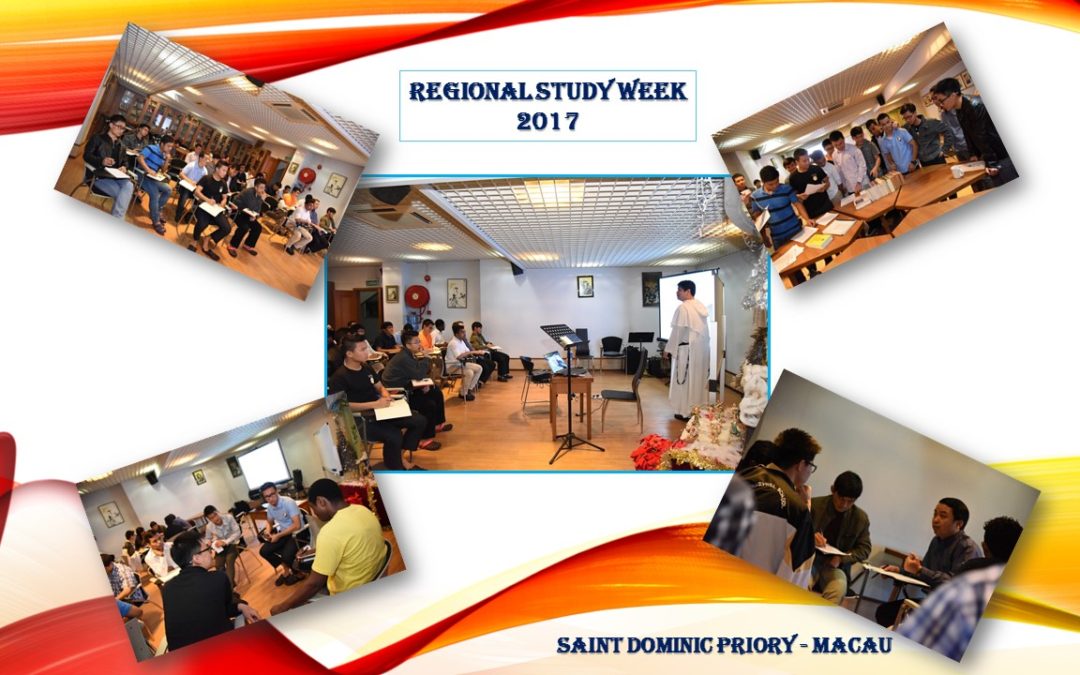
Every year, during the semester break of the classes in Seminaries for the Christmas Season and New Year, the Brothers who are studying in the Holy Spirit Seminary of Hong Kong Diocese and the Brothers who are studying in Saint Joseph Seminary (USJ)–Macau gather together at Saint Dominic Priory–Macau to have a Regional Study Week.
This year the theme of the course was on “Introduction to Homilectic.†This interesting and inspiring workshop was given by Fr. Edmond Eh, OP, the Moderator of Studies of the Province of Our Lady of the Rosary, on January 03 – 07, 2017. Attracted by the theme of the course which was organized by the Dominican Friars, this time besides about twenty Dominican simply professed students took part in the course, we also welcome two Brothers from the Divine Word Congregation (SVD) to join us in this time.
Though the course was short, but we did had a chance to study and develop our skill, based on two parts: Lectures on how to prepare a good homily and Application on practice preaching. The lecturer emphasized the importance of the preachers as instruments of God for the salvation of souls and building up the kingdom of God on earth. As an itinerant preacher of God is to preach/to bring the Message of God to the people. Therefore, in our Dominican preaching to have a good homily, Fr. Edmond said: “our preaching has always been rooted in a scientific study of theology and discerning the ‘sign of the times’ which proceeds from supernatural principles and illuminated through prayer.†Truly, as Dominicans, we are invited to imitate our Founder, Holy Father Saint Dominic who was a man of prayer and preacher.
To have this chance of being together joyfully and fruitfully, we are grateful and thankful to the Fathers of the Formation Council who have given us this opportunity. And particular thanks for the guidance of Fr. Edmond throughout the course.
We pray to the Good Lord through the intercession of our Holy Father Saint Dominic, may He bless us and guide us on our journey To Praise – To Bless – To Preach.
Macau January 7, 2017
Bro. Joseph Tran Van Huong, OP
Ps. Here below we want to share with you some pictures of our classes and activities during the course.
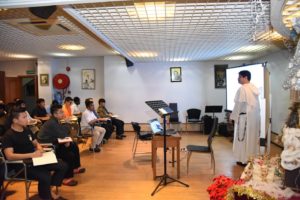 Â
 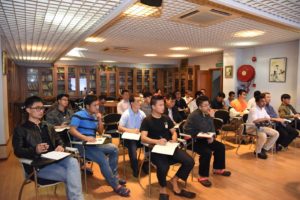 Â
  Â
 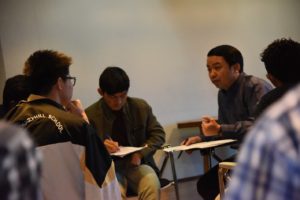
 Â
  Â
 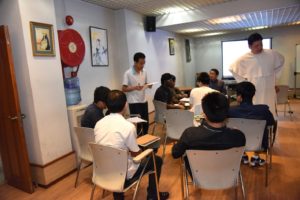 Â
 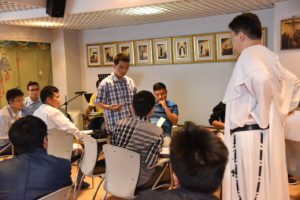
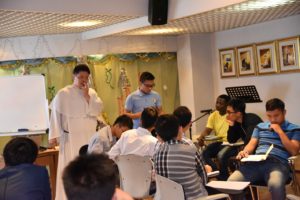 Â
 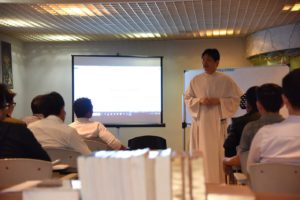
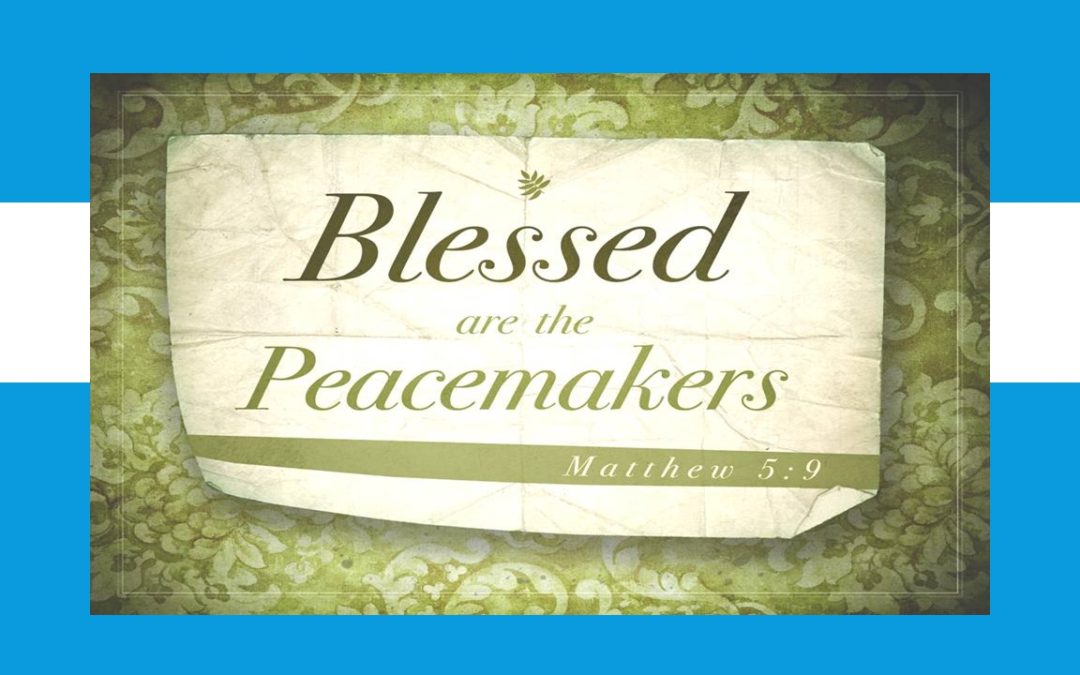
    The first day of every year is, for us Christians, the Solemnity of the Motherhood of Mary and International Day of Peace. I wish to share with you, the Message of Pope Francis.
    On January 1, 1968 Blessed Pope Paul VI inaugurated the year with the First Message of the World Day of Peace on The Day of Peace. On January 1, 2017 Pope Francis continued the fruitful tradition by celebrating the Fiftieth World Day of Peace with a powerful message entitled Nonviolence as a Style of Politics for Peace. Hereafter, I wish to present and reflect on this wonderful invitation of Pope Francis to all to be peacemakers through nonviolence.
    Why did Pope Francis select nonviolence as a peaceful style of life? Because violence continues to abound in our hearts and in our world. Unfortunately, we live in a “broken world,†in a “horrifying world†where war is fought piecemeal. Pope Francis cries out that there is “piecemeal violence†of different kinds and levels: “War in different countries and continents; terrorism, organized crime and unforeseen acts of violence; and the devastation of the environment†(2017 Message 1). There are weapon traffickers, and vast amounts of resources are spent for weapons of war while young and old people suffer terrible hardships. In our world, there are domestic violence and abuse of women and children (nos. 2, 4, 5).
    How may we fight violence nonviolently? Violence is fought and healed not by more violence but by active nonviolence.  Active nonviolence does not mean surrender, or lack of social involvement, or passivity. It overcomes the temptation to retaliate. Active nonviolence is a quality of authentic human and Christian love, which presupposes justice and respects truth.
    How to achieve fuller and wider peace in our world? Our common humanity and our faith command us to be peacemakers. One starts by acquiring internal and external personal peace. To be instruments of peace, we have to banish violence “from our hearts, words and deeds†(no. 7). We work for social peace by practicing equality, love and solidarity; by witnessing and promoting integral ecology, which means human dignity and rights, freedom, justice, truth and peace, and the integrity of creation.
    Is it hard to be peacemakers in our families, in our communities, in our world? We have amazing models to follow. Jesus, the model, proclaims nonviolence by his life and message. He walks the path of loving nonviolence “to the very end, to the cross, where he became our peace and put an end to hostility†(3). He preaches the unconditional love he lives, a love which shares with the needy and forgives all, including enemies. The Gospel of Jesus focuses on the Sermon on the Mount and the Good News of nonviolent love, on the eight Beatitudes: Blessed are the meek, the merciful, the peacemakers…
    Pope Francis mentions other well-known models of active nonviolence: St. Francis, St. Therese of the Child Jesus, and Saint Mother Teresa of Kolkata; Gandhi, Martin Luther King Jr, Leymah Gbowee and women. Pope Francis underlines the essential role of the family in promoting peace and nonviolence: “An ethics of fraternity and peaceful coexistence†starts in the family. All religions contribute to peace in the world. Pope Francis says that “no religion is terrorist, peace alone is holy, not war.â€
    The Pope from Argentina recalls the example of St. Therese and invites us to practice her “little way of love, not to miss out on a kind word, a smile or any small gesture which sows peace and friendship†(5). He brings to our attention the example and words of Saint Mother Teresa who says: “We in our family don’t need bombs and guns to destroy, to bring peace – just get together, love one another… And we will be able to overcome all the evil that is in the world†(3). Indeed, there is no way to peace, peace is the way (Gandhi). Hence, “We adopt the means of nonviolence because our end is a community at peace with itself†(Martin Luther King Jr).
    Pope Francis points out the forceful messages on loving and peaceful nonviolence of popes Paul VI, John Paul II and Benedict XVI. Who does not remember the piercing words of Blessed Paul VI at the United Nations in New York (October 4, 1965): “No more war! War never again! It is peace which must guide the destinies of peoples and of all mankind.†St. John Paul II proclaims: “Justice and forgiveness are essential to healingâ€; “May people learn to fight for justice without violence, renouncing class struggle in their internal disputes and war in international ones†(no. 4). Pope Francis quotes from the teachings about nonviolence of Pope Benedict XVI, who says:“For Christians, nonviolence is not merely tactical behavior but a person’s way of being, the attitude of one who is convinced of God’s love and power that he or she is not afraid to tackle evil with weapons of love and truth alone. Love of one’s enemies constitutes the nucleus of the Christian revolution†(3). I remember well the powerful statement of the Philippine Bishops just a few days before the EDSA peaceful revolution: “We insist, our acting must always be according to the Gospel of Christ, that is, in a peaceful, nonviolent way†(CBCP, February 14, 1986).
    In his fourth Message for the World Day of Peace (2017), Pope Francis makes a strong plea: “I plead for disarmament and for the prohibition and abolition of nuclear weapons.†The Pope adds: “Nuclear deterrence and the threat of mutual assured destruction are incapable of grounding†an ethics of “fraternity and peaceful coexistence between individuals and among peoples.†This ethics “cannot be based on the logic of fear, violence and closed-mindedness, but on responsibility, respect and sincere dialogue†(5).
    Active violence is also creative nonviolence: it actively creates new ways and methods and activities to achieve peace nonviolently in different situations and places. The world-wide movement of nonviolence relies radically on a deep spirituality which helps nonviolent peacemakers answer nonviolently any provocation. Nonviolence, a product of justice, truth and love is also, Pope Francis tells us, prayerful nonviolence: “Nothing is impossible if we turn to God in prayer. Everyone can be an artisan of peace†(7). The reigning Pope stresses the need of prayer to witness nonviolence in our life, to make nonviolent love the style of life.
    We celebrate today the Motherhood of Mary: Mary, the Mother of God. This is how she is called through the first centuries of Christianity. Mary is the Mother of Jesus, who is the Son of God and the Son of Mary: “She conceived, brought forth and nourished Christ; presented Him to the Father in the temple, and was united with Him in suffering as He died on the cross†(LG, 61). Mary is, certainly, the Mother of the Child Jesus, and also the Mother of the Crucified and Risen Lord. May Mary, the Mother of God and our Mother, the Queen of Peace (Regina pacis) help us all be committed to peace in our world – a world that longs for peace here, there and everywhere!
    In closing, two inspiring texts that come to mind: First keep yourself in peace and then shall you be abler to bring others to peace (Kempis). Acquire inner peace and thousands around you will find liberation (St. Seraphim).
(Fausto Gomez OP, Jan 1, 2017)
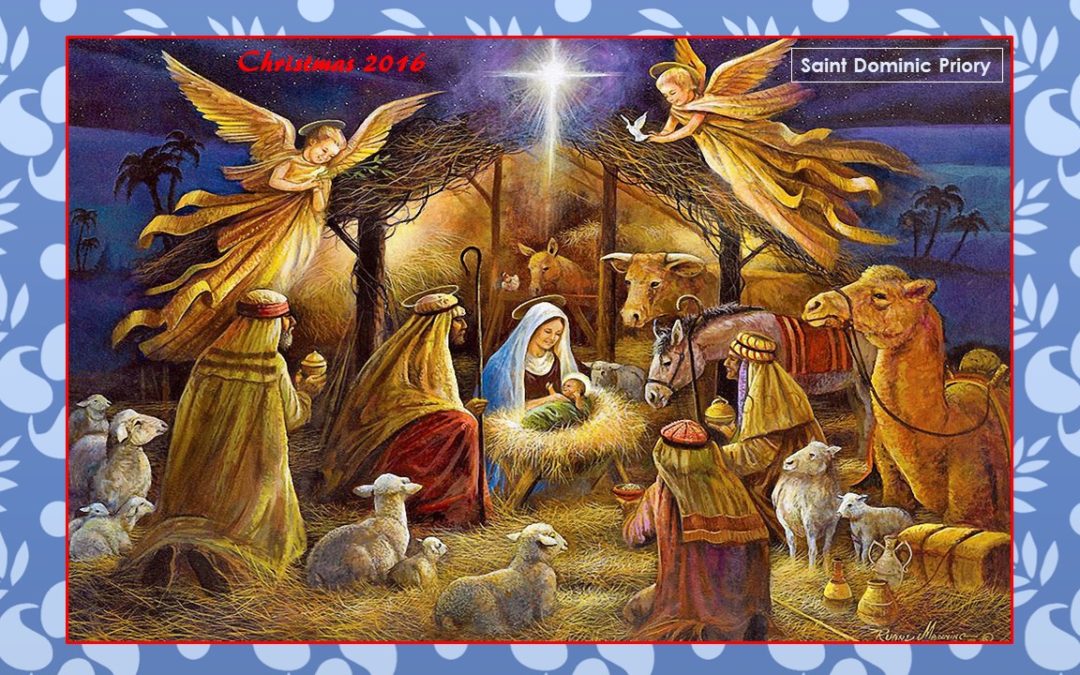
We are celebrating the Nativity of the Lord that takes place at about midnight when nature sleeps. It takes place tonight in our hearts and in our community as we re-live liturgically that first and glorious night.
The sacred readings inspire us. The prophet Isaiah cf. Is 9:1-6): “For a child is born to us, a son is given us… They name him Wonder-Counselor, God-Hero, Father-Forever, and Prince of Peace.†(It is also inspiring to listen to the Messiah of Handel) Saint Paul (Tit 2:11-14): “The grace of God has appeared saving all … The appearance of our great God and savior Jesus Christ.†St. Luke (Lk 2:1-14): (Angel to shepherds): “You will find an infant wrapped in swaddling clothes and lying in a manger.â€
We all know the meaning and the mystery of Christmas: “God so loved the world that He gave us his only Son.†Tonight and through the Christmas Season, we contemplate the Child Jesus in the crib. Let me share with you a few pointers that might be helpful to you as they are to me.
A Christmas Carol from Belgium tells us something truly moving: The shepherds go to offer gifts to the Child Jesus: cheese, honey, a lamb… One shepherd goes with empty hands. Why do you come to adore the little Child without any gift? The shepherd answers: “I only bring my surprise!†Every Christmas brings us believers an unimaginable surprise: “And the Word was made flesh and dwelt among us.†What a sublime surprise, what an amazing grace! What incomparable beauty. St. John of God loved to repeat: “If you wish to see and contemplate beauty on earth, ask the Lord to give you: eyes to see a young girl with a little child on her arms in a portico of Bethlehem. There is nothing more beautiful.†Blessed Angelico painted the crib and St. Dominic kneeling before the Child Jesus contemplating the mystery of Christmas, mystery of our faith: “He became what we are that we might become what He is†(St. Athanasius). How can this be? Â
A large family in a rural town goes to the Christmas Midnight Mass, except a young man who stays home because he cannot believe that God became man. This is – he said – impossible! There was that night a raging snow storm; it was windy and freezing. From the window of his room, he sees a flock of birds in the backyard: the birds are looking for shelter. He tries to help them by opening the door of the barn, but the birds are afraid and do not follow him to the barn. He puts bread crumbs along the way leading to the barn. No dice. He tries to befriend the birds by walking and raising his arms as if flying. Once again, no dice. Then he realizes something: “If only I could be a bird for a moment, perhaps I could save them.†At that very moment, the story goes, he hears the church bells ringing the Glory of Christmas and became aware of the mystery of the Incarnation: “Now – he says – I see why God has to become one of us, to save us†(from Louis Cassels). Jesus was born and died to save us and to show us the way to salvation and happiness – the way of love.
Sometime ago, little children presented a Play of the Nativity. All the teachers of the elementary and the parents of the children were present and eagerly waiting for the play to start. The angels came, the shepherds followed, and then Mary – very close to give birth – and Joseph. They were looking for a place to stay – and Mary, to give birth to Jesus. Mary and Joseph knocked at the door of the inn, and a little child of six opened the door. They asked him: “Please can we have a room for the night?†The boy innkeeper answered: “Sorry, there is no room in the inn.†But immediately the innkeeper changed his mind and said (and this he invented): “Hang on! Don’t go away. You can have my room†(from Margaret Silf).
“May Jesus have my room – my heart? May he have yours? “Each one of us is an innkeeper who decides if there is room for Jesus†(Max Maxwell). And, as we know – and as we feel by just imagining the real crib , the crib of Bethlehem -, a room for Jesus today means to be truly sensitive towards the needy – to a few concrete people who are in need in our midst.
This comment moved me to meditate: “Christ is always with us, always asking for room in our hearts…  I’m sure that the shepherds did not adore and then go away to leave Mary and her Child in the stable; but somehow found them room, even though what they had to offer might have been primitive enough. If we hadn’t got Christ’s own words for it, it would seem raving lunacy to believe that if I offer a bed and food and hospitality for Christmas – or any other time, for that matter – …my guest is Christ…†(Dorothy Day). On the background of the real manger we can read these invisible words from Jesus, the preacher:   “What you do to the least of my brothers and sisters you do it to me.†I am not trying to put too much seriousness on the joy and beauty of Christmas as a family feast. I am – aren’t we all? -for a joyful and beautiful and sweet Christmas. But true joy and beauty and sweetness are qualities of true happiness that only comes from solidarity with others and compassion to the needy – and God’s grace, which is always available to us. The real enemy of Christmas – of my happiness – is my selfishness, my “fat ego.†Therefore I am in need of “un-selfing.†Are you? Jesus is here to help us do what we can and pray for what we cannot.
And yes, by all means, “Glory to God in the highest and peace to all men and women.†My dear sisters and brothers: How do we respond to the unique surprise of the mystery of the birth of Jesus? How? By striving – I suggest – to celebrate Christmas with the right attitude. We celebrate the Birth of Christ in this Liturgy, that is, we re-live the birth of Jesus in the Liturgy and in our lives. We celebrate this Holy Eucharist with hopeful faith, joyful gratitude, and, above all, with an attitude of humble adoration.
Adoration means recognizing our radical dependence from God and from his grace. Humble adoration is the attitude of Christmas: it is the attitude of Mary and Joseph, who adore the child Jesus in awe and amazement; the attitude of the shepherds, who kneel before the crib with faith and humility; the attitude of the Magi, who present their gifts to the child as a symbol of their veneration of the Child.
May we all, lovers of Jesus, have a Blessed Christmas, that is, may Jesus continue growing in our hearts and may those around us notice it by the way we treat them with kindness and compassion.
Dear Mary, Mother of the Son of God and our Mother, help us all to have and live this blessed or happy Christmas. Amen.
(Fausto B. Gómez, St. Dominic Priory, Dec 24, 2016)

Dear Lord Jesus Christ, on the day of the celebration of the Jubilee 800, and just before Christmas, I wish to pray before you as a member of the Dominican Province of Our Lady of the Rosary. Gratefully, joyfully and humbly I beg for your graceful help for the brothers who announce your Kingdom in Japan, Korea, Singapore, Hong Kong, Macau, Mainland China, Philippines, Spain, Venezuela, Myanmar and Timor Leste. We pray for the civil authorities and citizens of these countries. Help us all, Lord, preach in these beautiful lands your Good News of love and salvation, be the voice of the voiceless and defend the poor, the unborn children, the neglected elderly, the migrants, the refugees and other ethnic groups excluded from the table of life.
Beloved Emmanuel, I humble ask your grace and blessings for the local churches where we minister: bless our bishops and priests and religious women and men and the lay Christians. Help us be part of the local community of disciples and cooperate harmoniously with all the agents of evangelization. Aid us to be faithful and joyful in preaching your Good News the Dominican way, which is based on contemplative prayer, supported by community life, enlightened by continuous study of your Word, and witnessed by a simple life style – all for the salvation of souls, of all peoples.
Dear Son of God, I pray for the global Dominican Family and in particular for the Dominican Family in the Asia/Pacific Region. I beg you, Lord, to strengthen our resolve to be a family united in communion and mission. Help us cooperate with each other and rejoice together for the marvelous works done by our brothers and sisters. Before your divine presence, I humbly ask for forgiveness for the offenses the brothers of our Province – past and present – have committed in our ministries and in our relations with other Provinces in Asia. To you, dear Lord whom we preach, I offer our determination to walk together, as a true Dominican Family, by the path of dialogue, reconciliation, prayer, and love. May our Jubilee 800 be – more than anything else – the unique opportunity to be truly converted individually, to renew our communities and thus be able to preach You, Lord, with enthusiasm and zeal, and not only with our words, but also and mainly with our good deeds. Like our Father Dominic, we all point to you – only to you -, beloved Jesus Christ!
Merciful Good Shepherd, we pray to you for our youth. Please, Lord, touch their generous hearts to answer your call. Bless in particular all those who are at present on the path of Dominic: our postulants, novices, simply and solemnly professed brothers, our deacons and our recently ordained priests. May we the mature and elderly brothers listen also to their voices and be attuned to the changes that are needed to live the Dominican life in our changing world. May they be a sign of joyful hope for the whole Dominican Family!
Before you, our Crucified Lord, I remember our crucified brothers and sisters today: those maligned, persecuted, martyred; those silenced by various powers; those who feel perhaps that you have forsaken them! With my brothers here present, I remember also those in our convents and houses who are afflicted by mental or physical illnesses. Certainly, you are with them all, Lord. May we, too, be present in their life with fraternal compassion and tender care!
Dear Jesus, we are working for you. Indeed at times we fail, but we are always your servants. Remember, Lord, that we have left family, country, roots to be your missionary disciples. Take good care of our parents, brothers and sisters, our families. Bless those who are alive and grant peace to those who are already with you.
With Mary, Our Lady of the Way, with our Father Dominic, our brother Thomas, our sister Catherine, our brother Martin de Porres and all our saints, particularly our martyrs, we ask for your graceful help. We place our prayers of petition in your heart of mercy. Merciful Lord, as we long for your coming at Christmas, we praise you, we thank you, we adore you – we hope in you! To you be honor and power and glory forever and ever. Amen
(Fausto Gomez OP. Macau, St. Dominic Priory: December 22, 2016)
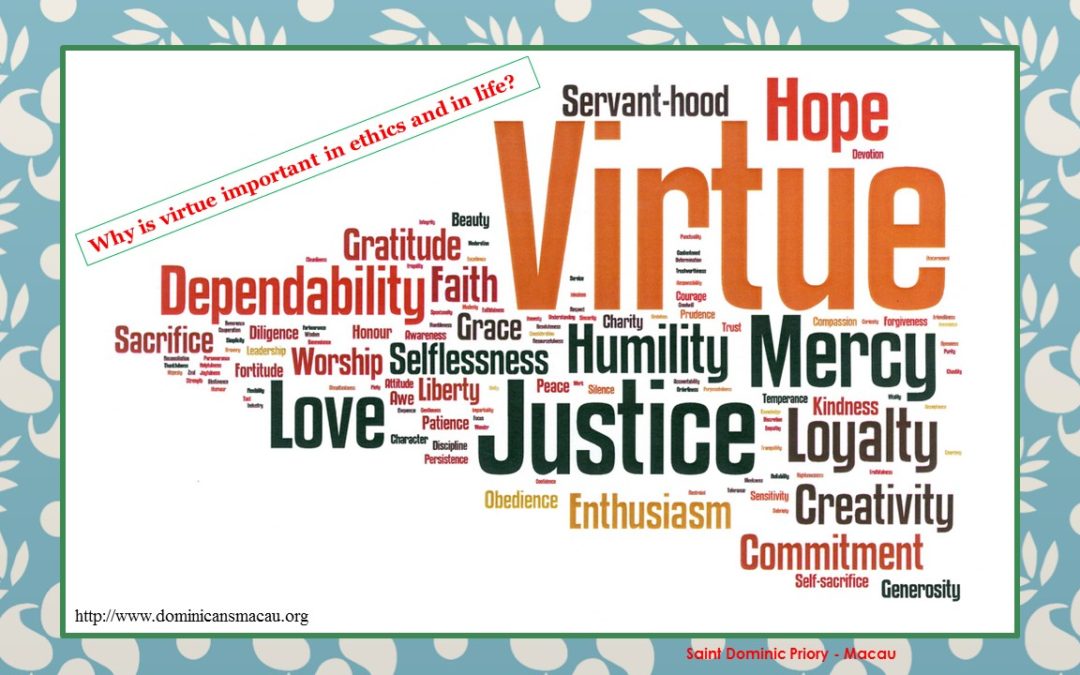
FAUSTO GOMEZ OP
    In life, virtues are necessary and attractive sources of goodness and happiness. In classical ethics, in moral and spiritual theology, the study of virtue constitutes a fundamental significant chapter. Hereafter I wish to reflect on virtue and virtues from the perspective of reason and faith.
    The natural longing for true happiness is directed and strengthened by a virtuous life. After all, happiness consists in the practice of virtue that entails the good use of freedom (St. Thomas Aquinas). Truly, the purpose of ethics is “to make people good, that is, virtuous†(P. Kreeft).
    Why is virtue important in ethics and in life? Because virtue is a kind of excellence of the soul, a basic trait of character, and a positive moral attitude. In traditional ethics and theology, virtue is defined as a good operative habit. Virtue is a habit, that is, a human quality that disposes the person’s potencies towards good. Virtue is an operative habit, that is, it inclines a person to act in a manner that is pleasant, prompt and easy. Virtue is, specifically, a good operative habit: this quality of goodness distinguishes virtues (good attitudes) from vices (evil attitudes).
    While virtue enhances vision, vice darkens and finally blinds (G. Meilaender). Virtues are intrinsic principles of good deeds. They are embedded in the potencies of the person (intellect, will, sense appetite) who possesses them. Virtues are “successes in self-realization†(C. van der Poel), qualities that make persons “flourishing human beings.†Indeed, virtue attracts and fascinates (Spinoza).
    In every virtue, the human person says “yes to all that is good†(B. Haring). Every virtue is a mediation of love, which is the foundation, the form and the goal of all virtues. Virtues are rooted in and perfected by love. Vivified by love, virtues incline us to deeper love and communion with God, neighbor and creation.
Lao Tzu writes:
          I am kind to the kind, / I am also kind to the unkind, / for virtue is kind. / I am faithful to the faithful, / I am also faithful to the unfaithful, / For virtue is faithful.
    According to origin, virtues are distinguished into acquired virtues (by personal effort, by repetition of similar acts) and infused virtues (by God). While acquired virtues perfect the human person in such a way that he/she may walk properly according to the natural light of reason, infused virtues perfect the human person in such a way that he/she may walk properly according to the light of grace (St. Thomas Aquinas). Grounded on grace, infused or supernatural virtues orient human potencies and human or natural virtues towards divine life – towards God. Among the infused habits, we have the following: the theological virtues, the moral virtues (elevated by divine grace), and the Gifts of the Holy Spirit. The theological virtues (faith, hope and charity) are the supernatural habits that, infused by God, relate us directly to him (cf. CCC 1812-1828).
    Human virtues, which are perfected and elevated by divine grace and the infused moral virtues, put order in our personal and social life. The intellectual virtues (understanding, science, wisdom and prudence) incline us to know and understand and judge well, but not necessarily to be good persons. On the other hand, moral virtues (the cardinal virtues and many others) make human actions good and also the persons who perform them. The moral virtues rectify the whole ethical life of the person who possesses them by putting order in the intellect (prudence), in the will (justice) and in the sense appetite (courage and temperance). Since the time of Aristotle, the most important human virtues are the cardinal virtues of prudence, justice, courage and temperance. It has been said that the moral life of the human person pivots upon these four virtues as the door upon its hinge. Virtues are connected among themselves: there can be no true prudence without the other three moral virtues, and, vice versa: no moral virtues without prudence. Prudence is the main rational and ethical guide of human life (cf. CCC 1805-1809).
    From the perspective of human ethics, what are the most important virtues today? A good life, an accomplished life, a happy life is a life lived in justice and love. Justice and love continue to be the most significant virtues today. In a world of injustice, there is a continuing need of justice, which inclines us to give to each person his/her due, that is, fundamentally his/her rights. Justice, in turn, needs the virtue of love to become even a just justice. In a world of selfishness, pride and hatred, there is a great need of love. Love means to give to another person not only what is his or hers, but also of what is “ours.†The greatest virtue in human and Christian ethics is love or charity: as philia (“I am happy that you existâ€), as agape (“I am ready to give my life for youâ€). Love is expressed, in particular, in solidarity with the poor, the sick, the abandoned, the unhappy and the disadvantaged in our families, communities and societies.
    For Christians, as St. Ambrose says: “To speak of virtue is to speak of Christ,†who is the Virtuous One. And to speak of Christ is to speak, above all, of charity as love of God and neighbor – as agape -, which is the “form†of all virtues: “Over all these virtues (mercy, kindness, humility, meekness, patience, forgiveness) put on love, which binds the rest together and makes them perfect†(Col 3:14).
    Is it really hard to be virtuous? It is important to note before trying to answer this question that one who longs to be virtuous has to love virtue and to love his or her vocation. Vocation and virtue fortify each other, for genuine vocation is a call to passionate love, to virtuous life.
    I had a medical student who was really fascinated by the teaching on virtues: “It is so attractive. It is easy to have virtues: virtues are like a garden where one can pick the virtues she likes.†To love virtues is easy, but to practice them takes a little longer! Ethically speaking, the truly virtuous person is not born, but made! A person is made virtuous by performing over and over good acts, which form good habits, that is, virtues that form a good character. One acquires the virtue of compassion by performing compassionate acts.
    Is it hard to acquire and practice virtues then? Yes and no: Yes very hard, if one wants to acquire and practice them by himself or herself alone. Not so hard, if the person is guided by significant others, and cooperates with God’s grace, which is available to all. Let me add that usually God does not grant dole-outs but seeds to be watered and nurtured.
    William James suggests four steps to acquire human virtues: First, make a strong resolution; second, make no exceptions; third, actualize resolution often, and fourth, make daily and generous exercise of resolution.
    May virtue be taught? In a way, yes! How may it be taught? By teaching verbally and practically the qualities that make a person “good.†In truth, only the just man or woman knows what justice is; only the Good Samaritan knows what genuine merciful love of neighbor is. Philosophers and theologians have repeated that the best way to define virtue is by pointing to a virtuous person. The authentic path to describe the virtuous person is by pointing to a person who is honest, kind, compassionate, humble and prayerful – a good person.
    Do we really, really want to be happy? Socrates says: The person who knows what is right will do right. Because why would anybody choose to be unhappy? For the great Greek philosopher and ethicist Socrates, knowing what is good implies doing it. For ordinary mortals, however, it is not that easy: we know what is right and often we don’t do it! Happiness, however is found in practicing what is good, which is best way of knowing virtue: “To know and not to do is not yet to know†(Buddhist Proverb).
    In a well-known poem, Samuel Smiles tells us simply and beautifully that to be virtuous is not that difficult:
                               Sow a thought and you will reap an act.
                               Sow an act and you will reap a habit.
                               Sow a habit and you will reap a character.
                               Sow a character and you will reap a destiny.
(Published in O Clarim, November 25, 2017)

 Â
  Â
  Â
 
 Â
  Â
  Â
 
 Â
 




